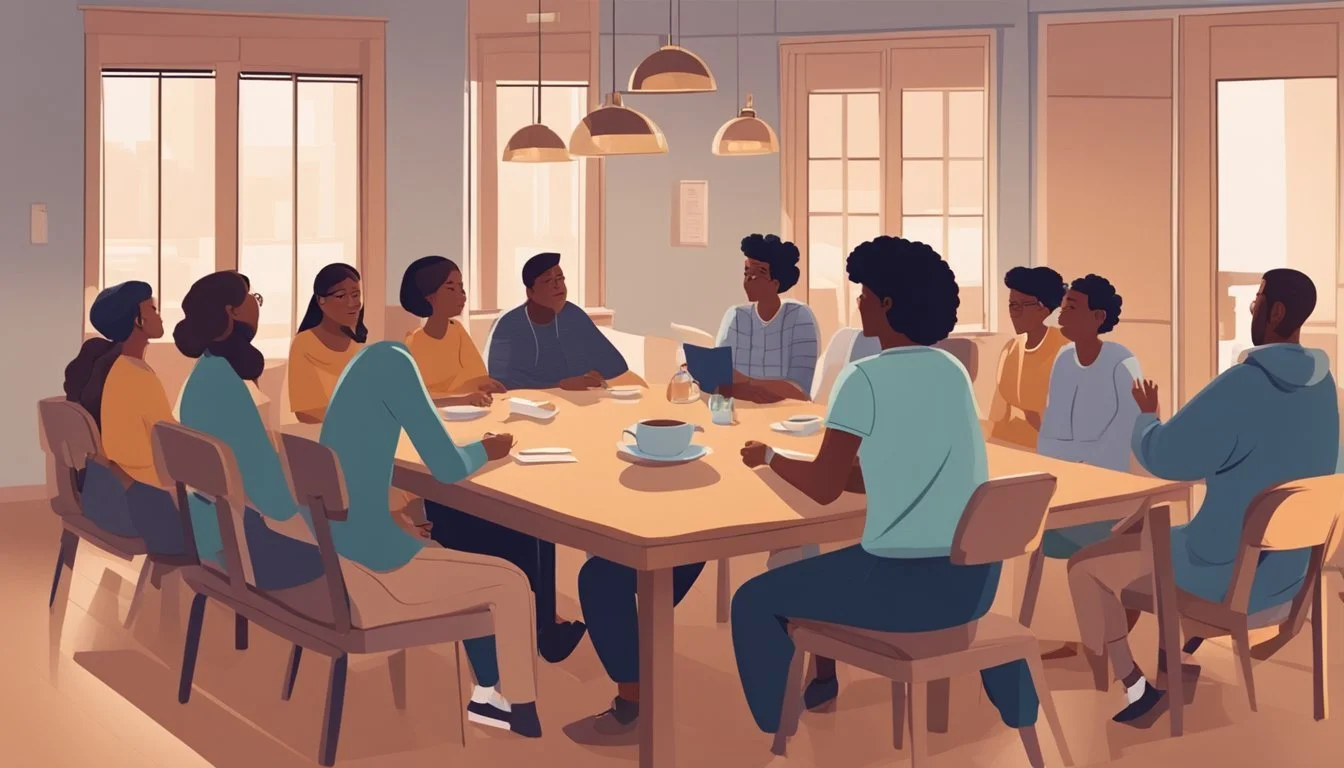8 Ways to Support a Loved One with Complex PTSD
Effective Strategies for Caregivers
When a loved one is grappling with complex PTSD, the path to support can often seem intricate and challenging. It's essential to recognize the profound impact that PTSD has on a person's emotional and mental well-being. Understanding how to effectively support someone with complex PTSD can make a significant difference in their recovery journey.
Navigating this territory requires both compassion and patience. The steps you take to offer support can help your loved one feel more secure and understood, fostering an environment conducive to healing. With the right approach, your efforts can truly make a positive impact on their life.
1) Educate Yourself on PTSD
Understanding Complex PTSD begins with gathering accurate and comprehensive information. Familiarize yourself with the symptoms, behaviors, and potential triggers associated with the disorder. Utilize reputable resources, such as medical journals, verified health websites, or expert consultations.
Books and articles written by professionals in the field can provide valuable insights. Consider reading about personal experiences from those who have lived with PTSD. This can help create a more empathetic and informed perspective.
Engage in online courses or workshops that offer in-depth knowledge about PTSD. Many organizations and mental health professionals offer educational programs designed to equip families with practical strategies for support.
Join support groups or forums where you can connect with others who are also caring for someone with PTSD. These communities can provide first-hand advice, shared experiences, and additional resources.
Regularly update your knowledge as new research and therapies emerge. Staying informed about developments in PTSD treatment and management is essential for effective support.
Consider reaching out to a mental health professional for guidance. Many therapists and counselors offer consultations specifically to educate family members about PTSD.
For more detailed information, visit resources like Supporting Your Loved One with Complex PTSD or How to Help Someone with PTSD.
2) Listen Without Judgment
Listening without judgment is essential when supporting a loved one with Complex PTSD. It helps create a safe and supportive environment where they can express their feelings freely.
Avoid interrupting them. Let them speak at their own pace. Show empathy through affirming body language, such as nodding or maintaining eye contact.
Use neutral responses like "I understand" or "Tell me more about that." Avoid statements that may imply judgment or criticism.
Refrain from offering unsolicited advice. Instead, be there to listen and validate their emotions.
Being a safe space means not adding shame, guilt, or additional stress to their experience.
Remember, the goal is to support, not to fix. Listening without judgment fosters trust and encourages open communication.
Creating this environment can significantly aid in their healing process. Celebrate small victories and acknowledge their courage in sharing their struggles.
3) Help Create a Safe Environment
Creating a safe environment is crucial for someone with Complex PTSD. This involves both physical and emotional safety. Ensuring their living space is calm, predictable, and free from triggers can help reduce anxiety.
One way to establish safety is to maintain a routine. Consistency in daily activities can provide a sense of stability.
Another important aspect is open communication. Encourage them to express their needs and feelings without fear of judgment. This helps build trust and understanding.
Practicing patience is essential. Healing from PTSD is a gradual process, and setbacks can occur. Being supportive and patient can significantly impact their recovery journey.
Encourage healthy boundaries. This includes respecting their need for space and understanding their limits in social interactions. Boundaries help them feel more in control and secure.
Physical comfort is also important. Soft lighting, soothing music, and comfortable furniture can contribute to a relaxing atmosphere.
Minimize exposure to triggers. Identify and remove or reduce exposure to objects, sounds, or situations that may provoke traumatic memories.
Encourage self-care. Suggest activities that promote relaxation and well-being, such as yoga or reading. Self-care routines can help them feel more secure and grounded.
By combining these strategies, a safe and supportive environment can be created, essential for the mental health of someone with Complex PTSD.
4) Encourage Professional Therapy
Encouraging a loved one with complex PTSD to seek professional therapy is crucial. Professional therapists are trained to handle the complexities of PTSD and can offer treatment options such as Cognitive Behavioral Therapy (CBT), Eye Movement Desensitization and Reprocessing (EMDR), and other trauma-focused therapies.
It's essential to approach this topic with sensitivity. Suggest therapy as a positive step towards recovery rather than something they need to fix problems. Emphasize the benefits of talking to a specialist who understands their experiences and can provide coping strategies.
Counseling from a trauma-informed professional can be pivotal in their recovery journey. This type of therapy offers a safe space for the individual to process their trauma and learn effective techniques to manage symptoms.
For further guidance on supporting someone with complex PTSD, visit Turning Tides Today. Encouraging professional help shows your commitment to their well-being and acknowledges the seriousness of their condition, paving the way for healing and stability.
5) Respect Their Boundaries
Respecting boundaries is crucial when supporting someone with complex PTSD. They may need space and time to process their thoughts after an episode.
Never push them to talk about their trauma if they’re not ready. It can be a delicate subject and rushing them could cause more harm than good.
Listen to their needs and preferences. They might have specific triggers or situations they want to avoid. Understanding these can help you avoid unintentionally causing distress.
When they set boundaries, acknowledge and honor them. This demonstrates respect and builds trust, which is essential for their healing process.
Maintaining patience and understanding is key. Their boundaries might change over time, and being flexible can help them feel safe and supported.
By respecting their limits, you contribute significantly to a safer and more supportive environment for their recovery.
6) Assist with Daily Routines
Supporting a loved one with Complex PTSD (CPTSD) by assisting with daily routines can provide stability and decrease stress.
Help them plan daily activities. Creating a schedule for meals, exercise, and relaxation can improve their sense of control. This consistency can ease anxiety and promote a sense of normalcy.
Offer to help with household chores. Laundry, cleaning, and grocery shopping can become overwhelming tasks. Sharing these responsibilities can lighten their load and allow them to focus on self-care and treatment.
Encourage healthy habits. Remind them to take medications and attend therapy appointments if they have them. Consistent support in maintaining these routines reinforces their importance and aids in their recovery.
Create a calm environment. Simple actions like reducing clutter and maintaining a peaceful atmosphere can significantly impact their wellbeing. A serene home setting can be a refuge from external stressors.
Assist with meal planning and preparation. Maintaining a balanced diet is crucial for mental health. Helping to plan and prepare nutritious meals can ensure they have the energy needed for healing and coping.
Participate in daily physical activities together. Exercise can greatly improve mood and reduce symptoms of CPTSD. Taking walks, practicing yoga, or engaging in other physical activities can be beneficial and foster a supportive relationship.
Daily routines may seem mundane, but stability and consistency offer vital support for someone with CPTSD.
7) Support Their Self-Care Practices
Encouraging self-care practices is crucial for someone with complex PTSD. Self-care can help manage stress and promote emotional well-being.
Encourage activities like regular exercise. Physical activity, such as walking or yoga, can help reduce anxiety and improve mood.
Eating a balanced diet is another key aspect. Nutrient-rich foods provide the energy needed to cope with daily stress.
Sleep is vital for mental health. Recommend maintaining a consistent sleep schedule to ensure they get adequate rest.
Encouraging participation in hobbies can also be beneficial. Creative outlets or enjoyable activities can offer a positive distraction and a sense of accomplishment.
Consider suggesting meditation or mindfulness practices. These can help them stay grounded and reduce symptoms of PTSD.
Connecting with support groups can provide a sense of community. They can share experiences and gain advice from others facing similar challenges.
By supporting their self-care practices, you contribute to their overall mental and emotional stability. For further reading, visit SANE's comprehensive guide.
8) Provide Consistent Emotional Support
Someone experiencing Complex PTSD benefits greatly from knowing they have a dependable source of emotional support. This consistency helps to create a sense of safety and trust in the relationship.
It's important to be patient and understanding. Emotional flashbacks and mood swings can be challenging, but providing calm and steady support makes a significant difference in their recovery process.
Checking in regularly with simple messages or gestures can remind them they are not alone. This offers reassurance and helps to reinforce trust and stability.
Listening actively when they choose to share their feelings or experiences is crucial. Avoid interrupting or offering unsolicited advice. Being a reliable listener validates their emotions and encourages open communication.
Maintaining a calm demeanor, even in the face of volatility or anger, is essential. Reacting with empathy and understanding, instead of frustration, can help to de-escalate tensions and provide a grounding influence.
To support someone with Complex PTSD, caregivers also need to take care of their own emotional well-being. Engaging in self-care ensures they are capable of providing the consistent support needed. Taking breaks and seeking professional advice when necessary benefits both parties.
For more detailed recommendations on supporting someone with Complex PTSD, you can refer to this comprehensive guide on support strategies for CPTSD.
Understanding Complex PTSD
Complex PTSD is a mental health condition resulting from prolonged exposure to traumatic events, often during childhood. It involves a complex array of symptoms and differs significantly from PTSD.
Symptoms of Complex PTSD
Complex PTSD often includes a combination of emotional, physical, and cognitive symptoms. Key emotional symptoms include intense feelings of shame, guilt, and a pervasive sense of helplessness. Individuals may experience chronic sadness, anxiety, and difficulty managing emotions.
Physically, sufferers often demonstrate heightened arousal symptoms such as insomnia, nightmares, and an extreme startle response. Cognitive effects include disturbed thinking patterns, including negative self-perception and difficulty trusting others. Relationships may suffer due to these issues, leading to social isolation and conflicts in interpersonal interactions.
Differences Between PTSD and Complex PTSD
PTSD typically results from a single traumatic event, such as a natural disaster or an assault. Complex PTSD, by contrast, is associated with prolonged trauma over months or years, such as ongoing physical, emotional, or sexual abuse.
While PTSD features re-experiencing the traumatic event, avoidance behaviors, and hyperarousal, Complex PTSD adds layers of complications. These include persistent negative self-image, relationship difficulties, and emotional dysregulation.
Significantly, the treatment approaches differ; Complex PTSD often requires more prolonged and multifaceted therapeutic strategies tailored to address the depth of the trauma and its diverse impacts on the individual's life and identity. For a more detailed discussion, see CPTSD: Understanding Complex Trauma & Its Recovery.
Effective Communication Strategies
Effective communication is crucial for supporting a loved one with complex PTSD. It involves active listening and expressing empathy and validation.
Active Listening Techniques
Active listening involves fully concentrating on what the other person is saying without interrupting or offering unsolicited advice. This means making eye contact, nodding, and providing verbal cues like "I see" or "I understand." It's also helpful to repeat back what they've said to confirm understanding. Avoid distractions such as phones or televisions during these conversations. Creating a safe space for open communication can encourage more in-depth sharing. Active listening not only helps in building trust but also in understanding the specific needs and triggers of someone with PTSD.
Expressing Empathy and Validation
Expressing empathy involves acknowledging the other person's feelings and experiences without judgment. Simple statements like "That sounds really tough" or "I can see why you feel that way" can be very powerful. Validation means accepting their emotions as real and understandable, even if you can't relate to them personally. Avoid minimizing their experiences or suggesting quick fixes. Providing consistent emotional support through positive affirmations can make a significant difference. Regular check-ins, whether through texting or calling, show ongoing concern and support, making the person feel valued and understood.
Encouraging Professional Help
Encouraging a loved one with complex PTSD to seek professional help can be crucial in their healing journey. Professional therapy offers structured support and proven methods for managing symptoms, while finding the right therapist can make a significant difference in the effectiveness of treatment.
Types of Therapy Available
Several types of therapy can help individuals with complex PTSD. Cognitive Behavioral Therapy (CBT) focuses on changing negative thought patterns and behaviors. Eye Movement Desensitization and Reprocessing (EMDR) helps in processing traumatic memories. Dialectical Behavior Therapy (DBT) teaches coping mechanisms and emotion regulation.
Prolonged Exposure Therapy involves reliving trauma in a controlled environment to lessen its impact. Somatic Therapy addresses the connection between mind and body, helping patients release trauma stored physically. Understanding these options can help in making informed decisions about treatment.
Finding the Right Therapist
Finding the right therapist involves research and patience. Look for a therapist specializing in trauma or PTSD. Certifications, such as those from the EMDR International Association, indicate specialized training. Personal recommendations and online reviews can provide insights into a therapist’s approach and success with other patients.
The therapeutic alliance is crucial. The individual must feel comfortable and understood by their therapist. It's beneficial to schedule initial consultations with a few therapists to determine the best fit. Websites of mental health organizations can offer directories to help find qualified professionals in specific areas.








